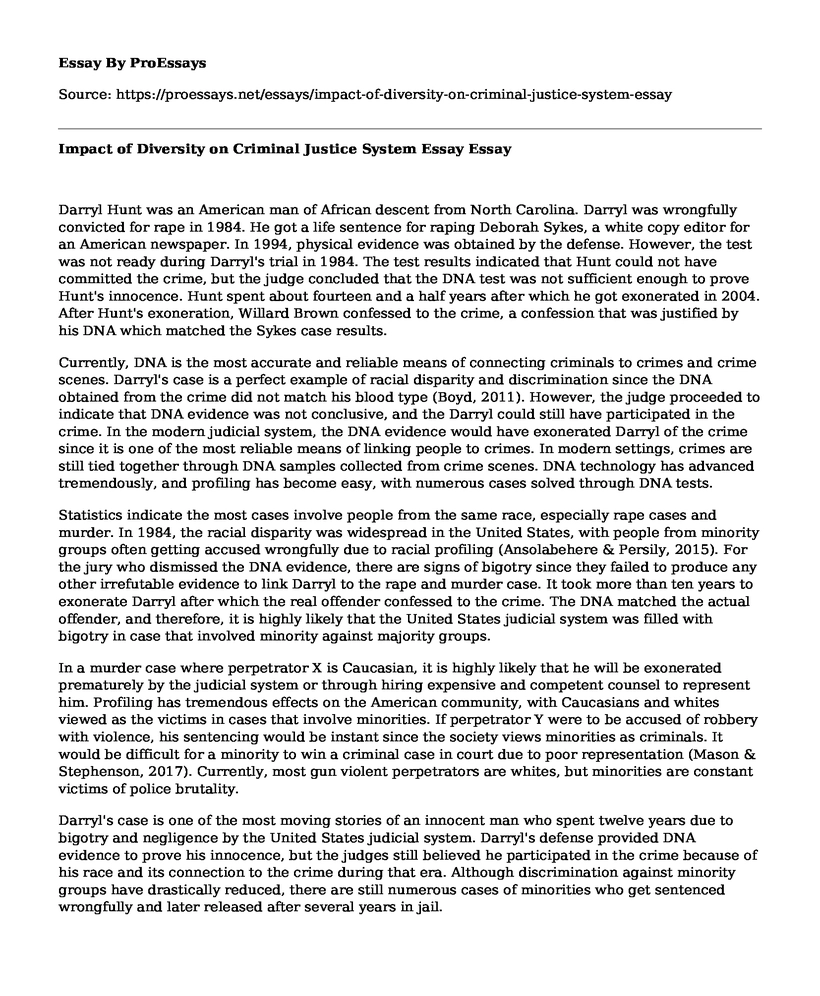Darryl Hunt was an American man of African descent from North Carolina. Darryl was wrongfully convicted for rape in 1984. He got a life sentence for raping Deborah Sykes, a white copy editor for an American newspaper. In 1994, physical evidence was obtained by the defense. However, the test was not ready during Darryl's trial in 1984. The test results indicated that Hunt could not have committed the crime, but the judge concluded that the DNA test was not sufficient enough to prove Hunt's innocence. Hunt spent about fourteen and a half years after which he got exonerated in 2004. After Hunt's exoneration, Willard Brown confessed to the crime, a confession that was justified by his DNA which matched the Sykes case results.
Currently, DNA is the most accurate and reliable means of connecting criminals to crimes and crime scenes. Darryl's case is a perfect example of racial disparity and discrimination since the DNA obtained from the crime did not match his blood type (Boyd, 2011). However, the judge proceeded to indicate that DNA evidence was not conclusive, and the Darryl could still have participated in the crime. In the modern judicial system, the DNA evidence would have exonerated Darryl of the crime since it is one of the most reliable means of linking people to crimes. In modern settings, crimes are still tied together through DNA samples collected from crime scenes. DNA technology has advanced tremendously, and profiling has become easy, with numerous cases solved through DNA tests.
Statistics indicate the most cases involve people from the same race, especially rape cases and murder. In 1984, the racial disparity was widespread in the United States, with people from minority groups often getting accused wrongfully due to racial profiling (Ansolabehere & Persily, 2015). For the jury who dismissed the DNA evidence, there are signs of bigotry since they failed to produce any other irrefutable evidence to link Darryl to the rape and murder case. It took more than ten years to exonerate Darryl after which the real offender confessed to the crime. The DNA matched the actual offender, and therefore, it is highly likely that the United States judicial system was filled with bigotry in case that involved minority against majority groups.
In a murder case where perpetrator X is Caucasian, it is highly likely that he will be exonerated prematurely by the judicial system or through hiring expensive and competent counsel to represent him. Profiling has tremendous effects on the American community, with Caucasians and whites viewed as the victims in cases that involve minorities. If perpetrator Y were to be accused of robbery with violence, his sentencing would be instant since the society views minorities as criminals. It would be difficult for a minority to win a criminal case in court due to poor representation (Mason & Stephenson, 2017). Currently, most gun violent perpetrators are whites, but minorities are constant victims of police brutality.
Darryl's case is one of the most moving stories of an innocent man who spent twelve years due to bigotry and negligence by the United States judicial system. Darryl's defense provided DNA evidence to prove his innocence, but the judges still believed he participated in the crime because of his race and its connection to the crime during that era. Although discrimination against minority groups have drastically reduced, there are still numerous cases of minorities who get sentenced wrongfully and later released after several years in jail.
References
Ansolabehere, S., & Persily, N. (2015). Testing Shaw v. Reno: Do Majority-Minority Districts Cause Expressive Harms. NYUL, Rev., 90, 1041.
Boyd, S. B. (2011). Making Justice Our Business: The Wrongful Conviction of Darryl Hunt and the Work of Faith.Oregon: Wipf and Stock Publishers.
Mason, A. T., & Stephenson Jr, D. G. (2017). American constitutional law: introductory essays and selected cases. Routledge.
Cite this page
Impact of Diversity on Criminal Justice System Essay. (2022, Feb 22). Retrieved from https://proessays.net/essays/impact-of-diversity-on-criminal-justice-system-essay
If you are the original author of this essay and no longer wish to have it published on the ProEssays website, please click below to request its removal:
- The HRBA and the Approach Used by Kenya Essay
- How Do the Agencies of the Criminal Justice System Work Together to Provide Justice?
- Comparison Between the Ring of Gyges Story and John Stuart Mill: The Theme of Justice
- Paper Example on Violating the Privacy of Employees
- Essay Example on Sal's Struggle: Growing Up in a Different Family Structure
- International Criminal Courts: Prosecution of War Crimes, Genocide & Beyond - Essay Sample
- The Dark Side of Technology: The Growing Threat of Cybercrime - Essay Sample







